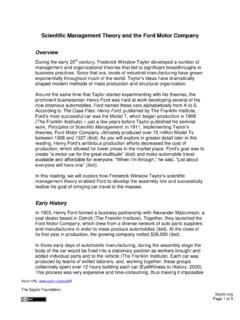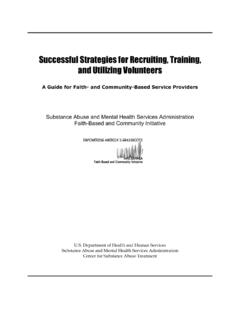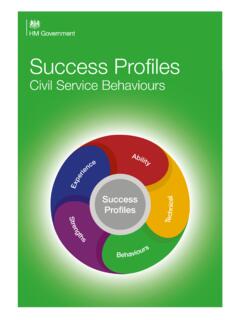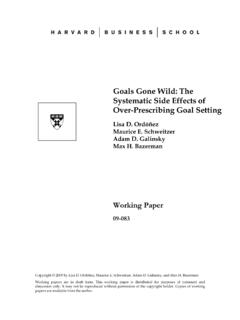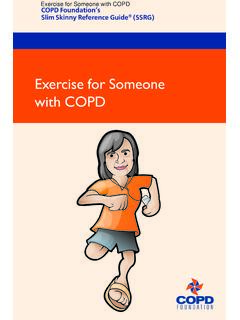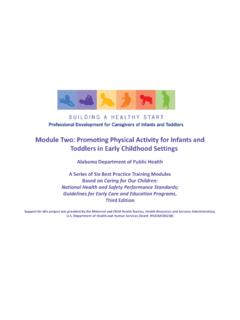Transcription of Carers and personalisation: improving outcomes
1 Carers and personalisation : improving outcomes Social Care 15181 Carers and personalisation : improving outcomes Crown copyright 2010 403881 1p 0K NOV10 Web Only First published 25 November 2010 Published to DH website, in electronic PDF format only. 2 Carers and personalisation : improving outcomes Carers and personalisation : improving outcomes Prepared by: Bernadette Simpson and Robin Murray-Neill National personalisation Advisers personalisation Team Department of Health Wellington House 133 155 Waterloo Road London SE1 8UG For further information, see the Department of Health website or 3 Carers and personalisation : improving outcomes Contents 4 1. Carers as expert care partners and whole-family 2. Early intervention and 3. Making self-directed support processes work for Carers ..17 4. Market and provider Carers and personalisation : improving outcomes Introduction Historically there has often been too much of a divide between the user and the carer, whereas the physical and emotional well-being of both are inextricably linked.
2 Dame Philippa Russell, Chair, Standing Commission on Carers If we are to meet the challenges of both financial constraint and population change, we must work more effectively, making better use of what we know and what we have. This means harnessing the vast knowledge and expertise of Carers themselves, alongside that of those they support, and integrating support arrangements wherever possible, both across statutory, voluntary and community organisations, and within the family or other contexts in which care and support are provided. Opening up public services to challenge is a core component of the Big Society and Carers knowledge and expertise will be vital in holding local commissioners and care providers to account. Big Society is also about encouraging people from all walks of life to play a more active part in society - developing a society that is more responsive and accessible to the needs of Carers should be a key strand.
3 1 This short paper offers signposts for better practice and outcomes . It will be of interest to Carers and those they support, and to all others engaged in providing Carers support, including personalisation /transformation leads in councils. The material can be used to stimulate progress on the achievement of outcomes both for Carers and for personalisation more generally, consistent with the A Vision for Adult Social Care: Capable Communities and Active Citizens. It includes examples to illustrate how the principles of personalisation have been applied, emphasising the value of finding ways forward that make sense and work best locally. One of the challenges of personalisation is to enable commissioners, providers, Carers and those they support to develop can do thinking around care and support that is at once responsive, creative and sustainable.
4 Such a systems-wide transformation, enabling care and support arrangements that are person centred and self-directed, requires that family members and Carers , other than in very specific circumstances, have to be regarded as experts and care partners. Recognised, valued and supported: next steps for the Carers Strategy (HM Government, 2010) emphasises the importance, in the context of the recent Spending Review, of involving Carers in delivering on Quality, Innovation, Productivity and Prevention (QIPP) workstreams such as end of life care and long-term conditions. The personalisation of services and support promotes choice, control and independence for Carers , tailoring solutions around the individual and the family. Important elements of personalisation are active citizenship, the promotion of stronger communities and preventative action.
5 The agenda applies equally to Carers and those they support and reflects the interdependence that exists between them. 1 HM Government Recognised, valued and supported: next steps for the Carers Strategy November 2010 5 Carers and personalisation : improving outcomes personalisation means that all services and support available to Carers should be tailored to their specific needs as far as possible: for example, that advice and information should be inclusive of all, including disabled Carers , young and older Carers , inter-generational Carers and Carers from ethnic minority groups, and that universally available services should be flexible in their approaches in order to respond to the variety of ways in which those with caring responsibilities can be supported. 2 If we are to achieve this, there is a need to: recognise the expertise of, and work in genuine partnership with, Carers at all levels of service design and delivery; enable Carers to design and direct their own support, have access to direct payments and be engaged in the support plan of the person they care for and the assessment where appropriate; wherever possible, establish whole family approaches3 that ensure there is integrated support planning that benefits everyone involved; fully recognise the differing social and emotional impacts of providing support to another person and that these do not necessarily correlate to the number of hours spent, or the tasks undertaken, in providing care.
6 And develop a range of support options and opportunities to match the diverse needs of Carers (including those who do not choose to identify themselves as Carers ) and the outcomes they wish to achieve in their lives. Many people who provide care do so for a member or members of their family, while others support friends and neighbours. Providing unpaid support to family members or friends is a major contributing activity to the health and welfare of our society. Each caring relationship is unique to those individuals involved, and this needs to be a fundamental consideration in any work with Carers and those they support. However, it is possible to identify some key themes in personalising support for Carers and some general principles about how to support and sustain the relationship between those involved. Each of the following chapters is based on a key theme and lists key practice statements that councils, NHS organisations and local partners can make use of in addressing local needs and expectations, and in determining what is likely to work well in their locality.
7 2 Recognised, valued and supported: next steps for the Carers Strategy (HM Government 2010) 3 In this document whole family approaches is used as an umbrella term and is inclusive of those caring arrangements made between people, such as friends or neighbours. 6 Carers and personalisation : improving outcomes 1. Carers as expert care partners and whole-family approaches An effective community-based approach is achieved when councils and their involve people, Carers , families and communities in the design, development, delivery and review of innovative care and support arrangements to maximise choice and independence and utilise the widest range of resources. 4 To recognise Carers as expert care partners is to value both their role in providing support and the wider knowledge and skills they possess as individuals.
8 Doing so greatly increases the likelihood of more personalised, responsive, and high-quality outcomes for those being supported, and makes Carers valuable and informed contribution available to other Carers , service providers and commissioners. To maximise the benefits of these partnerships, training and development opportunities are as important for Carers as they are for those employed in the health and social care workforce. The activity and impact of providing unpaid support is best understood in its context, as a relationship rooted in family, friendship or local community. While there may be specific differences between these contexts, the basic principles apply across them all. For simplicity, we refer to them all here as whole- family approaches . Too often, Carers have experienced a lack of co-ordination between the assessment of need for the person they support and both their own role in meeting that person s needs, and the support they might need in order to maintain that role.
9 At best this is unnecessarily time consuming and wasteful of resources, and at worst it can lead to inaccurate assessments of individual needs for support and mistaken assumptions about the willingness and ability of Carers to provide levels of care, which can have a detrimental effect on the health and well-being of all concerned. I am making my first steps giving support to people I care deeply about. I see the personalisation of services as a fantastic opportunity. My hope is that this approach will enable me to show my love for my family members in this very practical way for as long as it is needed. (A family carer) There is clear evidence of the effectiveness of whole-family approaches in addressing the most complex needs, and of the value of mediation and negotiation between family members when needed. Initiatives such as Family Group Conferencing can address issues such as risk, reliability or incompatible preferences that have frequently prevented whole-family working, and can also demonstrate the positive 4 Putting People First Consortium (2010) Think local, act personal: Next steps for transforming adult social care.
10 A proposed sector-wide commitment to moving forward with personalisation and community-based support 7 Carers and personalisation : improving outcomes value of dispute resolution. All families and those involved in caring relationships based on friendship or neighbourliness should have access to these opportunities when required. The facilitative skill will be to listen to all interested parties, resolve potential conflicts and arrive at a mutually acceptable plan that has taken the needs of Carers into account 5 Key practice points: Whole-family approaches are the starting point recognising the interdependence that most of us have with those closest/most important to us. Wherever possible and to the greatest extent possible, Carers expertise is recognised and utilised in assessing, planning and reviewing support to the person they care for, and in determining and meeting their own support needs.










